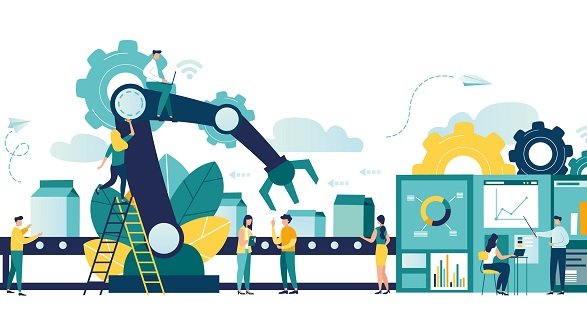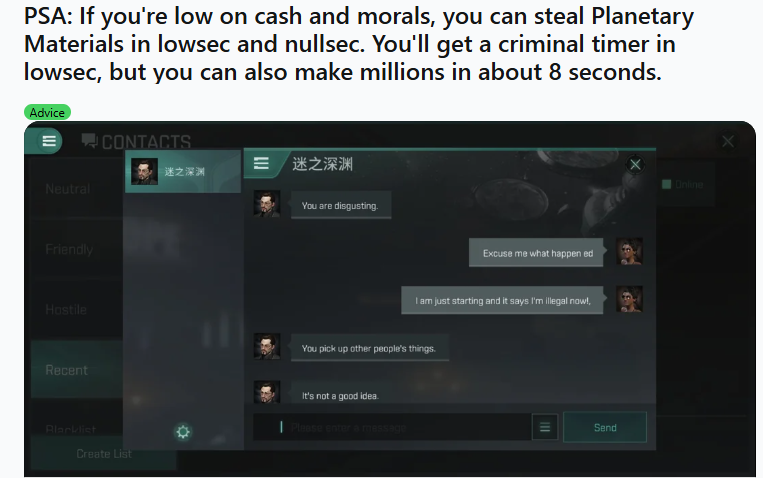
Massively squandered opportunity.
Thus far after being in the crypto space for 7 years I have to admit that gaming under this banner has been an abyssal disappointment. Every single game in crypto has teetered on a shitcoin full of complete and total unsustainable Ponzinomics. Every game is pay-to-win, even though we know that model to be highly ineffective and frustrating to players. But don't worry we'll just rebrand "pay to win" as "play to earn" using Ponzinomics and hope no one notices. Yikes!
But that's not even the worst part
The coup de grâce of this entire industry is that the games aren't even fun. We pretend like they are fun when number is going up and the hyperinflationary ponzinomics are going strong. Making money is indeed fun. But then that melts away pretty damn fast and we're left with a hunk of garbage and sore feelings. Maybe we keep playing to try and "make the money back" which is actually even more annoying because your time is getting sucked away by feelings of sunk-cost-fallacy.
The most frustrating thing about all of this for me is how much of a massive opportunity it is to have access to real money on the base layer in addition to a built-in massively multiplayer network. This is especially true on Hive where transactions are free and quite fast. Plus we all have human-readable screennames built into the base layer and associated reputations. We have the tools but we don't seem to have the vision... or we have the vision but we don't have the drive. Or we have the drive and the vision but we don't have the money or the resources to build the thing. It's maddening!
I have quite a bit of experience gaming, and a lot of that experience was dedicated directly to the in-game economy (assuming the game had an economy). I even gamed the hell out of Minecraft once and totally gamed the villager NPC economy, so it doesn't even necessarily need to be multiplayer, but crypto networks make multiplayer the standard just by how they operate.
I personally think game economies are awesome and I participate in them way more than the average player. I've made thousands of dollars worth of gold in World of Warcraft. If that economy had been a little bit better at eliminating exploits/bots... on top of being attached to a cryptocurrency... damn I could have EASILY just done that full time for a way better wage than what was being offered to me elsewhere during that epoch. Would this have been an emotionally satisfying job or provided any value to the real world? Not really, but it would have been cool nonetheless.

What are we doing here?
So for this post I just wanted to make some notes on all the variables that I've seen can make a massively multiplayer game great. I honestly wish I would have played all the great MMOs considered to have good economies, but alas I have not. Hopefully I don't miss something obvious here, but I guess that's what comments are for.
Priority #1: eliminate all bots.
A game with a good economy, and especially a crypto game with a good economy that can be seamlessly traded into Bitcoin, is always going to suffer from Sybil attack. This is where one entity exploits the economy by pretending to be multiple unique players at the same time. Often this is done with automation and bots, but it can also be done by hand to great effect in various situations (like logarithmic soft-caps and diminishing returns).
The truly unique thing about crypto is that if the game is transparent and anyone can peek at other players... well that also means anyone can hunt down bots and other exploiters to the network. We've yet to see a proper implementation of a community policing itself rather than depending on a centralized agent to do it. Closest we've come is downvotes on Hive, but Hive is not a video game and we've all see how dramatic people get over downvotes.
Of course banning or freezing these bot accounts can become a quagmire of drama in a decentralized ecosystem. For example, if the system is based on stake-weighted voting, how do we stop whales from deleting the accounts of people they simply don't like or are rivals with? This is a classic 51% attack problem that could be solved in various ways, but I won't get into it here.
Moving onto the actual game mechanics
Game economies can be done in an infinite number of ways, and it's unlikely that a single game will have all of these variables. Even if they do, these are generic concepts, and the devil is in the details when considering how they are precisely implemented in-game.
Raw Materials
Every MMO should have various unprocessed resources that can be processed into one or more items. For example, an alchemist might be able to collect herbs and then turn those herbs into various combat potions. It's possible that one herb could be one of the ingredients of several potions (one to many relationship). This type of relationship and ability to use one raw material for multiple purposes ensures that every resource has a base-level of demand within the market.
How raw materials are collected depends on the game and the resource. In an idle game these could be received simply by time passing by, while in an RPG they are often collected from slain enemies. A puzzle game might give them as a reward for solving puzzles.
Logistics
This is a variable that a lot of games do not have but can be used to great effect. It should not always be trivial to move resources from one area to another in game. By creating friction within the game and making it difficult/expensive to get certain resources to certain areas where they are needed: economic opportunities begin to materialize.
To give an example of something I've never even seen done before: imagine the player owns stake in some kind of mining operation. The raw material in question could be a variety of assets: gold, silver, copper, iron, coal, etc. What happens when we want to get that resource to a processing plant? Could it be intercepted and stolen by another player. I've never played EVE Online but I've been told it has these types of systems.

Skills
Players need the ability to turn raw materials into a useable product. It's possible the player themselves would have this trade-skill or could employ other's to do the work (NPCs or even other players). The problem we've seen with crafting in RPGs is that being able to craft really good gear diminishes the value of gear obtained in the more difficult dungeons. This and crafted gear can be bought and obtained without having done anything else, which in turn makes it easier for bots to exploit an economy using automation.
Intermediary Products
It's possible to create 'middle-man' products that are used in other products. A basic example of this would be turning iron into a gearwheel. The gearwheel by itself is useless but can then be used to build various endgame products later.
Specialization
The ultimate foundation of any economy is specialization. Specialization is the only reason any economy exists in the first place, including the real world economy. You would not need money if you could build your own house, car, and phone from scratch. Not only can no one do these things, but these things often take the collective effort of thousands if not millions of people at once, often in different countries, especially for the more complex stuff.
Even producing a graphite pencil requires hundreds of people.
With this in mind the ultimate end-game goal of any artificial economic system should be this idea that each player is supposed to have a very minor role within the economy. Everyone does their part and they trade with others to collect currency, and then use that currency to get what they need from other players. This is the ultimate foundation we should be striving for.
The problem with an artificial economy is that it is just that: artificial. There's no real value being created here, just pretend value that could just as easily be created by changing the code and printing it out of thin air. Herein lies the main problem of botting.
Because a botnet can setup an infinite number of accounts they can game the entire economy and fabricate a pipeline from start to finish without ever needing the assistance of another player. Or, even more likely, the bot just farms a single resource over and over and that resource essentially becomes counterfeit and floods the auction house; greatly reducing the value.
In the early days of WOW bots were not even required to game the economy. Servers in America created resources that were so valuable to other countries like China that the "Chinese gold farmer" was born. These people would farm WOW for 16 hours a day relentlessly, not even playing the game but slaying the same monsters over and over to turn a slight profit. It got so bad that Americans got quite racist over the whole debacle in many instances.
A balancing act
All of these problems circle back to the Sybil attack and exploitation of the ecosystem for profit. How can this be avoided? Ah, well, crypto is supposed to regulate itself so it should be easy with the correct template, but such a template has yet to be created (surprisingly).
For example one factor in the balancing act is how many daily-active-players a single server needs to be in the "ideal" state. How many players is low population and how many is overcrowded? The interesting thing about MMOs is that we usually just choose a server to play on, but with crypto it could be a lot more exclusive than that. Since we might only need 1000 active players it wouldn't be that hard to make an invite-only system to keep the server in balance without letting too many bad actors through the gates in the first place. On the flip side anyone who didn't get invited but still wanted to play would be able to bootup their own server with their own rules if they so desired. The code is open source after all, right?
Binding
- Bind on pickup
- Bind on equip
- Bind to account
Without binding a game's economy will be quickly destroyed because all the best items will eventually be found and once they enter the economy they will never leave it, and be circulated around to dozens of players indefinitely. It should not be allowed to reuse an end-product over and over again across the ecosystem. This would lead to hyperinflation and trivialize the entire experience. Binding makes it so once the trigger occurs (like putting on armor or attaching an upgrade/enchantment) the item becomes locked to that character or account for the rest of its existence.
Currency
Every game needs at least one currency. In WOW it was gold. The only way for gold to enter the economy was to sell trash to vendors. A small amount of gold would be minted out of thin air. There was no limit to how much garbage you could sell to a vendor, and every item was sold for a static price no matter how many of that item were dumped into the NPC void. It's easy to criticize a system that allows money to be printed out of thin air (as there is no limit to the amount of trash that can be farmed from respawning mobs) but this system worked pretty well at keeping the inflation rate relatively low even with an army of bots farming the game.
You'd assume that in this rich land of crypto that currency would never be an issue, but then you'd be wrong. As already stated above, devs can't help but create hyperinflationary Ponzi-schemes within their games. The system that WOW brought forward was 1000 times better than what I've seen in crypto, and that game was launched 20 years ago in 2004. Truly embarrassing if I'm being honest.

So how do we limit how much currency is being created in game? I've actually had a few ideas on this. The one that's popping into my head right now would be literal gold mines with diminishing returns. A gold mine has X amount of gold inside the mountain, and then we create some kind of halving event like Bitcoin where it gets harder and harder to mine the gold as more of it gets extracted. Using a logarithmic solution like Bitcoin ensures that gold can always be mined but max extraction is hard-capped by the algorithm. This is just one idea I've had and thought it would be cool for a crypto-game to use gold as a currency but also mimic the way BTC works.
Sinks
When a resource is not hard-capped and has a constant inflow into the economy it's good to put sinks in place that destroy the asset and lower the supply. In WOW gold is destroyed when players repair their gear. It is also destroyed when players use the auction house and are forced to pay listing fees and sales tax. There are many ways to setup these sinks to lower supply and increase the value of the currency or an otherwise flooded resource.
Conclusion
Well this is already pretty long so I guess I'll wrap it up here even though I could go on and on for quite some time on this stuff. At the end of the day it's very frustrating that the infinite greed within our ecosystem has led devs to revolve their game around value extraction and pay-to-win ponzinomics rather than creating something that is actually fun to play.
We don't even have to create something new here, as there are plenty of games out there which would be a lot more fun if we could bet on them. An example here would be a popular board game. If I could play Monopoly on the blockchain for a $1 buy-in and winner takes all I would do it. Maybe not the best example but you get the idea. Unfortunately these things never get built because crypto ironically has very few open source developers willing to build cool stuff and work for free/donations. Everyone wants to create a token and extract value from it. That is not the way, fam. It's a bad look and short-sighted, and I'm not quite sure how to bridge this gap other than hoping it sorts itself out after mainstream adoption and abundance have set in.
always happy to see you've made a game theory post. They always take me so long to read because I start having ideas and then find im reading the same sentence over and over repeatedly without taking anything in. I just did a 3 month unity course and joined the world game jam as well, but coding turns out to be pretty hard. Not sure Im quite ready to take on blockchain! but that said... how important is it to build Hive in from the start, or could you feasibly make a game with the blockchain in mind but then make all the necessary changes once the game was built?
This is my current checklist of concepts that Id like to bounce around:
what do you think? Is using HBD problematic? Id really prefer not to have a new currency involved.
also, Im not sure whether being able to pay to mint NFTs ad infinitum is so smart, but presumably there might be a way to let the market work this out.... if common items are cheaper to buy than mint, you wouldnt mint new ones (unless it had a very amusing randomised name, a special mint number, or perhaps a surprising combination of tactical abilities).... equally with legendary items, which would be more expensive to mint and probably even more specific in their abilities, so you would always be weighing up, does this add something to my arsenal? could I buy something cheaper or more specific on the market? Is this saleable or collectible for some reason?
please point out any glaring holes in this concept. Im probably never going to build anything this in-depth anyway, but as they say, its the thought that counts, and I bloody love thinking about this sort of thing! Its certainly more fun to think about that to build, and in most cases, its probably more fun than playing the steaming piles of trash that come out on the other side.
I actually think that Diablo 3 kind of ruined this for everyone even though it wasn't a blockchain game. The real world auction house was going to be a revolutionary thing and then it fell so flat that it became a laughing stock. I think that turned a lot of people off to the play to earn sort of stuff. Then when blockchain games came along they were already so jaded, plus they had their biases against crypto in general that it was a non starter for most people. I agree though, most of the games suck. I'd love to see some kind of Diablo game that uses blockchain. Most blockchain games are just glorified faucets with a snazzier front end (sometimes not even that).
funny that you mention this because I was giving advice for D3 to one of the lead developers at Blizzard.
I told him they absolutely had to create bind on equip items and he was like "nah we're not gonna do that".
So, like I said, all the best items were found and the entire system became a hyperinflationary joke.
I was pretty mad he didn't take my advice on a couple of things.
D3 also had one of the worst filters for searching for needed items...
and seemed to personally benefit coders who could tap into the API and sort out the data themselves.
The amount of Blizzard devs exploiting their own system was high.
On top of all the other bad actors.
Wow, that's pretty crazy. I played a lot of D3 after they got rid of the AH. I just recently started playing Path of Exile 2 and that has been interesting. It's sad that so many insiders were manipulating things, but I guess what else is new right!?
What I remember from that situation was that good items were selling in the auction house for hundreds of dollars and everyone was able to get at least excellent equipment easily with the ingame currency.
To balance the overabundance of godly equipment in the auction house they reduced the drop rates significantly. The consequence was that the game was no longer fun to play from a loot standpoint, you could go on an entire gaming session of a couple of hours and only find crap.
I have a vague idea of loot farms taking over and by the sheer number of hours played, they were basically the ones providing the best items everyone else was buying. The AH as it was along with the other rules about ownership the game had in place was turning the game into something ugly and distorted that wasn't a source of fun for most players anymore.
Once the auction house was shutdown I remember suddenly I was getting a ton of legendaries and set pieces and all kinds of good stuff every few minutes.
Yeah, it was very poorly implemented. It happened so quickly too. I remember I barely had time to play and then they were changing things, so I guess they took care of it quick, but It was just a bad roll out from the start.
Brilliant post. And sad, though maybe it will inspire some creative developer out there. I haven't played any of the games you mentioned so I can't speak on those but the way you explain it makes it sound easy enough, in theory. Is it hard for developers to work as a team on a single idea? Would you need a team to make a game with some of the mechanics you describe here? It's very interesting.
I love your idea of gold as a diminishing return currency. Let me know when that one's ready ;)
If a pencil takes thousands of people to build... yeah unfortunately games can rarely be built solo either.
This is a big reason why it's so difficult to get these projects funded.
It's a big risk.
The rewards earned on this comment will go directly to the people( @x-rain ) sharing the post on Reddit as long as they are registered with @poshtoken. Sign up at https://hiveposh.com. Otherwise, rewards go to the author of the blog post.
This made me laugh. Am all for living off my hobbies if I could
have you looked into World Shards? It is quite fun to play and has a few of the mecahnics built in. Refining loot to get different items and potions is at the base level of this game. We will see if it goes ponzi or not. I just value my time more than to dlay monsters over and over just to be able to build a furnace in my house…
The loot you find van be traded p2p drop rates are quite low though. No bind for weapons but weapons break and have to be reproduced which needs resources as well.
Did not do any research if and when they plan to drop a currency but it is likely they will.
Thanks for this Hame economy 101 it qas an interesting read!
I have not played it but they are all Ponzis
Mostly because bots are trivially easy to make and AI makes it even easier.
The key is a reputation system that can exponentially mitigate botting (doesn't exist).
Hive is the only network even capable of building a rep system like this.
The only ones that aren't Ponzis are the FPS games where you can't buy an advantage.
And they only use crypto for the skins and stuff.
But I don't like first person shooters.
Yeah I play one of those shooters. Kompete is really good.
I wouldn’t know how to bot World Shards though. The game is Wow style but the levels are super hard to beat.
I'm looking at it right now and it's advertised as "free to play and earn".
I guarantee you it's a Ponzi that will be botted into the ground.
You have to realize that people bot games that aren't even connected to money.
And they find a haphazard 3rd-party to sell the assets.
Not needing that 3rd-party makes it a thousand times easier to exploit.
have not planed to touch it, I just wonder how a bot like that would be programmed and operated. The levels contain varying riddles that have to be solved on the spot. They also do not repeat. But I guess everything can be botted in some way.
I'd have to play it to discuss further.
Maybe I will.
Sooner or later someone that can make one right will come along.
Thanks!
!PIZZA
$PIZZA slices delivered:
@danzocal(3/10) tipped @edicted
Hello edicted!
It's nice to let you know that your article won 🥈 place.
Your post is among the best articles voted 7 days ago by the @hive-lu | King Lucoin Curator by keithtaylor
You and your curator receive 0.0008 Lu (Lucoin) investment token and a 4.99% share of the reward from Daily Report 554. Additionally, you can also receive a unique LUSILVER token for taking 2nd place. All you need to do is reblog this report of the day with your winnings.
Buy Lu on the Hive-Engine exchange | World of Lu created by @szejq
STOPor to resume write a wordSTART